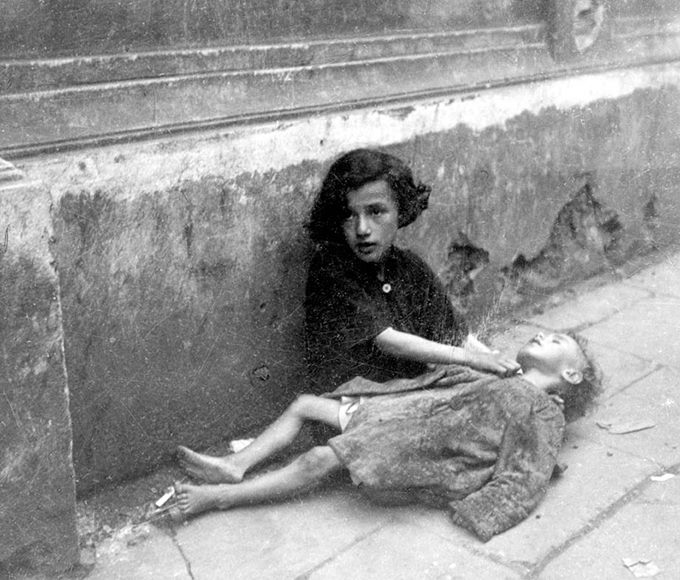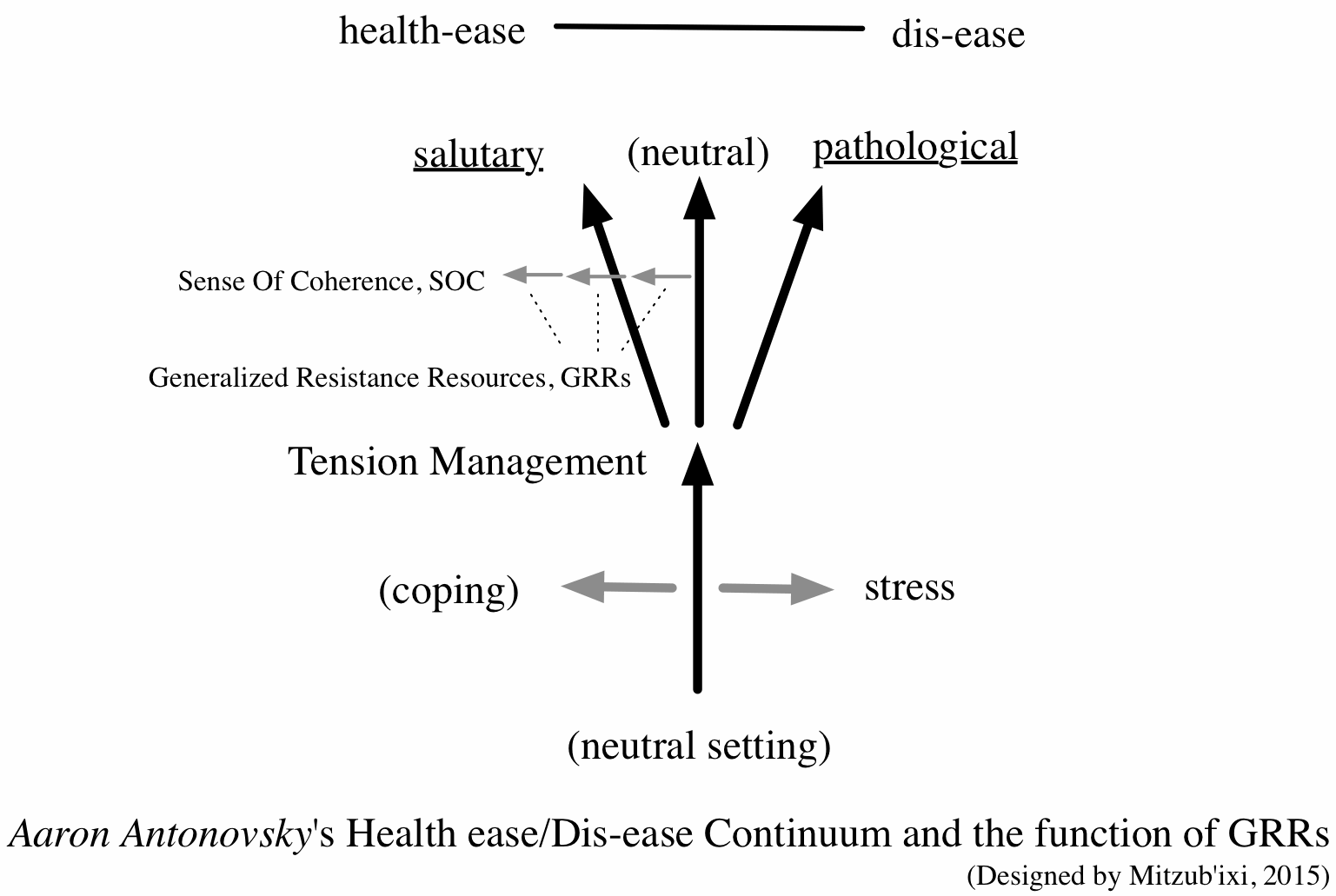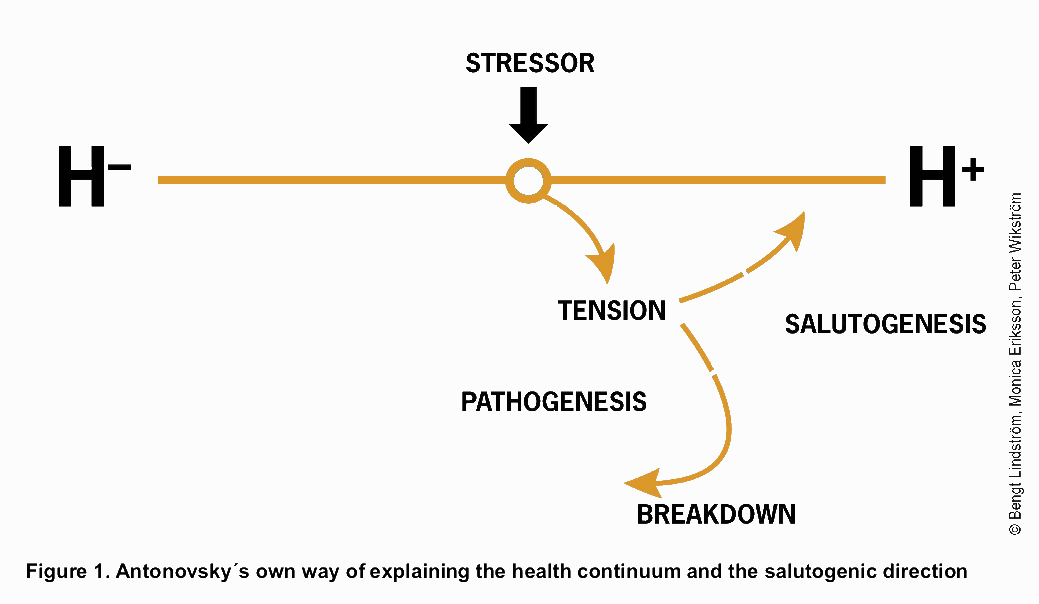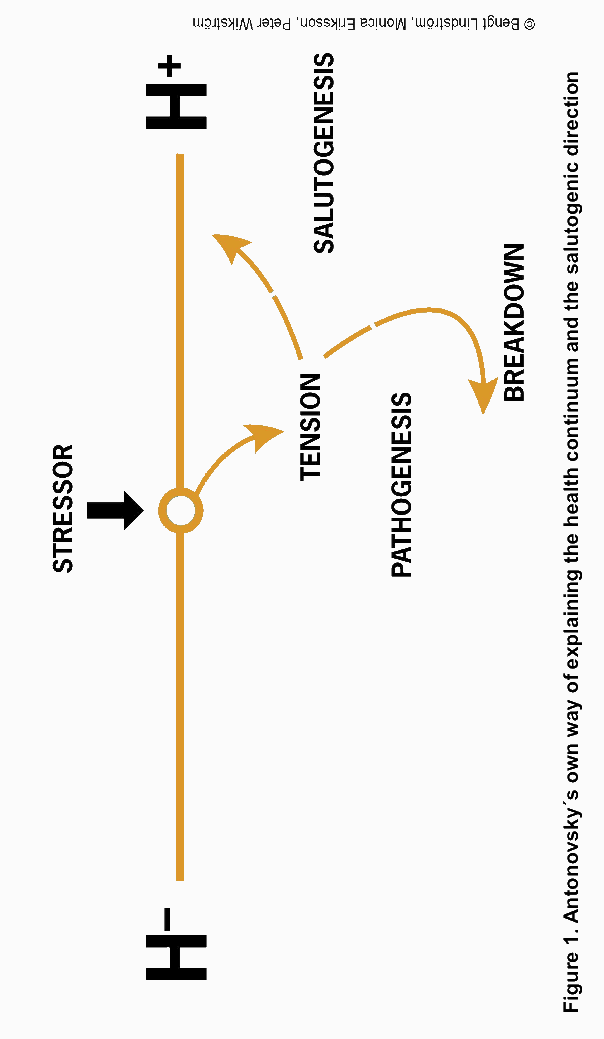Medical Sociology of the Aaron Antonovski's hypothesis
il Giorno della Memoria. Varsavia, Polonia - Bambini affamati seduti sul marciapiede nel ghetto./ Aaron Antonovsky, 1923-1994
アント ノフスキー理論の医療社会学—アーロン・アントノフスキーとユダヤ思想について—
【背 景】
アント ノフスキー理論とは、米国で生まれて1960年にイスラエルに移住して94年に亡くなった、ユダヤ系の医療社会学者アーロン・アントノフスキー (Aaron Antonovsky, 1923-1994)が提唱した、人間健康維持(あるいは健康回復)に関する仮説である。西洋近代医療(思想)に親しんだ者なら ば、比較的容易に理解可能な、自我の確立を前提にする健康の維持と回復に対する考え方であるとも言える。
【目 的】
1903 年のG.E.ムーア『倫理学原理』における健康の概念の「自然主義的見解」への批判にはじまり、1946年の世界保健憲章における健康の定義にク ライマックスを迎える「健康は個人の主体認識にも根ざす概念であり、社会・文化的にも相対的に決定される」という健康観の理論的精髄がこのアントノフス キー理論に顕れている。しかし、彼の理論上の逆説は、客観的な健康は主観的なSOCに由来するということであり、彼が健康を定義する前に「健康に思われる 集団」の特性をSOCで特徴づけられるものとして抽出した後でそれを改めて「健康な集団」だと評定するという循環論法がある。あるいは、SOCが高いこと が健康の生成に繋がるために、結果を原因で説明することを「定義」とせざるを得ない。このような彼の主張(=論理展開)は果たして正しいのか? アントノ フスキー自身が生きたユダヤ社会的経験から関連づけて、このことの位相関係を明らかにしたい。
【方 法】
アン トノフスキーの伝記的事実と、20世紀における健康の定義と健康観における多様性の広がりと展開について、文献の渉猟と思想史的方法によって考察す る。
【考察 と結論】
アント ノフスキーは、健康達成ないしは回復には、(1)健康を生み出す社会=身体的メカニズムと、個々人の主体のなかに(2)首尾一貫感覚(Sense of Coherence, SOC)が不可欠であるとした。前者は、サルートジェネシス(サリュートジェネシス)すなわち健康の生成論という考え方で、健康を維持できる個人と社会が おかれている状況のなかに健康を支配する要因すなわち衛生的要因(sanitary factors)があり、それらがうまく働くことが重要であるとした。また後者は、健康を増強するような強さは主体がもつさまざまな身体的社会的要素の結 合力(ないしは首尾一貫性)が十全であることを示したものであり、尺度化可能なものであり、彼とその共同研究者たちはSOCを質問紙法により尺度化するこ とに「成功」したと評価されている。
サ リュートジェネシスの考え方には、上記のような循環論法がみられるが、我々が日常経験のなかで用いている「健全なる精 神は健全なる身体に宿る」「身体だ けが健全ではその人は(心をふくめた全体性として)健全とは言えない」という経験的事実を、医療社会学の方法を用いて明らかにした功績は評価できる。しか しながら、思想史的事実としては、ユダヤ人の経験から導きだされたこと、ユダヤ思想的な健全観などが色濃く投影されている。アントノフスキー理論を通して 21世紀の健康についてより深い考察が期待できる。
【以 下、余滴】
上記 の、Aaron Antonovsky's Health ease/Dis-ease Continuum and the function of GRRs と同様の作図(スキーム)については、すでにGlobal Working Group on Salutogenesis of the International Union of Health Promotion and Education (IUHPE)の、Bengt Lindström教授(フィンランドの北欧公衆衛生学校[Nordic School of Public Health, 1953-2014])らによる、下記のようなものがある。この図は上下方向に健康と疾ー患 (health ease- dis-ease)が位置づけられているので、反時計まわりに回転すると、上記の私(池田)の作図の位置関係に類比することができる。
■SOC に類似の概念
・セル
フ・エフィカシー、ヘルスリテラシー、レジリエンス、ホープ、信頼(トラスト)、安心感覚(sense of
security)、安定感覚(sense of stability)、永続感覚(sense of permanence):(山崎
2008:49)。
・【Monica Eriksson 2010 によるコレクション!】
Learned
resourcefulness(Rosenbaum); Learned optimism(Seligman); Learned
hopefulness(Zimmerman); Sense of coherence(Antonovsky);
Self-efficacy(Bandura); Cultural capital(Bourdieu); Quality of
Life(Lindström); Connectedness(Blum); Hardiness(Kobasa); Social
capital(Putnam); Resilience(Werner); Flourishing(Keyes); Action
competence(Bruun Jensen); Empowerment(Freire); Will to meaning(Frankl);
Ecological system theory(Bronfenbrenner); Interdiciplinarity(Klein);
Coping(Lazarus); Locus of control(Rotter); Wellbeing(Becker);
■強い SOC(アントノフスキー)/よわい?SOC(プリニウス)
病気になることの精神的効用
「最近ある友人の疲労は、私たちに病弱であるうちが一番良いと忠告してくれたのです。体の弱い人が貧欲や衝動に掻き立て られますか。病弱な人は愛欲の奴隷 とならず、名誉を貪らず、金のことも気にしません。どうせあの世へ持って行けないと、僅かな金で満足します。病気のとき、改めて神々の存在に気づき、自分 らが人間であることを思い起し、誰をも嫉まず、誰にも驚嘆せず、誰をも見下さず、中傷や陰口に興味を抱かず、それを心の糧としません。風呂と泉の水だけを 心に描くのです。万一、病気から恢復すると、その後は快い平静な、つまり罪汚れなき幸福な生活を目指すことだけが、最高の関心事であり、最高の願いです。 そこで、私は哲学者たちが多弁を費し、たくさんの書巻で教えようとしていることを、簡潔にまとめて、あなたと私にこう宣言できるのです。
「病気のとき、なおったらそうしようと告白するような生活態度を、健康なとき守るべきである」」
(プリニウス『プリニウス書簡集』國原吉之助訳、pp.289-290、講談社、1999年)
■ 心の健全さについて(ウィリアム・ジェームズ)→【出典:心の健全さについて】
「前 回の集まり(第五講)で、健全な心の気質を考察したが、この気質は、苦悩を長びかせることが体質的にできないような気質で、ものごとを楽観的に見ようとす る傾向が、個人の性格を固める結晶水のようなはたらきをする、といった気質である。私たちは、この気質がどうしてある特殊な型の宗教の基礎となりうるかを 見た。それは、善が、たといそれが現世の生活の善であろうとも、善こそが、理性的存在たる者の心すべき根本的事柄である、と考えるような宗教であった。こ の宗教は、宇宙の悪い面をかえりみることのないよう人間に命じて、その悪い面を心にとめたり重んじたりするのを組織的に禁じ、思慮ふかい打算によって悪い 面を無視させ、それどころか、時には、悪い面の存在を頭っから否定させるのである。つまり、悪は病気なのである。だから、病気のことでくよくよ気をもむの は、そのこと自体、また一つの病気であって、もとの病気をただ重くするだけのことである。後悔や自責の念などの感情でさえ、善に奉仕するしもべの役をなす ものであるのに、病的な、心を弛緩させる衝動でしかない。最善の悔いとは、正義のために起って行動することであり、諸君がかつて罪とかかわりをもっていた ということを忘れることである、と考えられるのである」(『宗教的経験の諸相』上:195)。
AT our last meeting, we considered the healthy-minded temperament, the temperament which has a constitutional incapacity for prolonged suffering, and in which the tendency to see things optimistically is like a water of crystallization in which the individual’s character is set. We saw how this temperament may become the basis for a peculiar type of religion, a religion in which good, even the good of this world’s life, is regarded as the essential thing for a rational being to attend to. This religion directs him to settle his scores with the more evil aspects of the universe by systematically declining to lay them to heart or make much of them by ignoring them in his reflective calculations, or even, on occasion, by denying outright that they exist. Evil is a disease; and worry over disease is itself an additional form of disease, which only adds to the original complaint.
Even
repentance and remorse, affections which come in the character of
ministers of good, may be but sickly and relaxing impulses. The best
repentance is to up and act for righteousness, and forget that you ever
had relations with sin.
「ス ピノザの哲学は、この種の健全な心をその核心に織りこんでいるのであって、それが彼の哲学の魅力の一つの秘密ともなっている。スピノザによれば、理性に よって導かれる者は、その精神をまったく善の影響によって導かれる者である。悪の知識は、奴隷的な人間にのみふさわしい「不完全な」知識である。だからス ピノザは、悔いというものを無条件的に非難する。彼はこう言っている、——あやまちをおかすと、
Spinoza’s
philosophy has this sort of healthy-mindedness woven into the heart of
it, and this has been one secret of its fascination. He whom Reason
leads, according to Spinoza, is led altogether by the influence over
his mind of good. Knowledge of evil is an ‘inadequate’ knowledge, fit
only for slavish minds. So Spinoza categorically condemns repentance.
When men make mistakes, he says:
「良 心の苛責や悔いの念がおこって、人々を正道につれもどしてくれるものだと、あるいは期待されるかもしれない、そして、それだから、これらの感情は善いもの である、と結論したくなるかもしれない(事実、誰もがそう結論しているのである)。けれども、よく見てみると、良心の苛責や悔いは、善いものでないばかり か、かえって有害な悪い情念であることを、われわれは発見するのである。なぜなら、良心の悩みや自責の念に頼るよりも、理性と真理への愛とに頼るほうが、 いつでも、うまく暮らしてゆけることは、明白だからである。自責や悔いは、特殊な種類の悲しみにすぎないのであるから、有害な悪いものである。そして、悲 しみの不都合なことは」、と彼はつづけて、「私がすでに証明したところで、われわれは悲しみを人生から遠ざけるように努力しなければならぬということも、 私はすでに明らかにしておいた。良心の不安や自責の念も、この種の感情なのであるから、同様にまたわれわれはそのような精神状態を避けるように努めねばな らない——Tract on God, Man and Happiness, Book ii, ch.x」」(岩波文庫版『宗教的経験の諸相』上:195-196)。
“One might perhaps expect gnawings of conscience and repentance to help to bring them on the right path, and might thereupon conclude (as every one does conclude) that these affections are good things. Yet when we look at the matter closely, we shall find that not only are they not good, but on the contrary deleterious and evil passions. For it is manifest that we can always get along better by reason and love of truth than by worry of conscience and remorse.
Harmful are these and evil, inasmuch as they form a particular kind of sadness; and the disadvantages of sadness,” he continues, “I have already proved, and shown that we should strive to keep it from our life. Just so we should endeavor, since uneasiness of conscience and remorse are of this kind of complexion, to flee and shun these states of mind.”- Tract on God, Man, and Happiness, Book ii. ch. x.
文献
- Antonovsky, Aaron., 1979. Health, Stress, and Coping. San Francisco: Jossey-Base Publishers.(→英文レ ジュメ:パスワード付き)
- Antonovsky, Aaron., 1987. Unraveling the Mystery of Health. San Francisco: Jossey-Base Publishers. (→英文レジュメ:パスワード付き)
- アントノフスキー、アーロン『健康の謎を解く』山崎・吉井監訳、有信堂、2001 年(-->> L-Antonovsky_2001JAP.pdf with Password)
- Hilary Putnam, 2008. Jewish
philosophy as a guide to life : Rosenzweig, Buber, Levinas,
Wittgenstein., (The Helen and Martin Schwartz lectures in Jewish
studies). Bloomington : Indiana University Press. (英文レジュメ:パスワード付き)
- 池田光穂「ア ントノフキー仮説」
- 医中誌におけるアントノフスキーに言及した文献(2015年5月4日)
- 池田光穂、アー ロン・アントノフスキーの医療社会学:健康生成論の誕生,応用社会学研究,58:119- 130, 2016. 《Rikkyo_ApSociology58-2016-19.pdf》パスワードはありません
- Mitsuho Ikeda and Suh, Sookja. From Where does Our Health Come?: The Sociology of Antonovsky's Salutogenesis. Communication-Design 14:83-93, 2016《cdob_14_083.pdf》パスワードはありません
- ■アントノフスキー著作文献
*1961
- The early Jewish labor movement in the United States / translated and revised by Aaron Antonovsky from the original Yiddish edited by Elias Tcherikower, Yivo Institute for Jewish Research (1961)
*1965
- Antonovsky, A., Leibowitz, U., Smith, H.A., Medalie, I.M., Balogh, M., Katz, R., Halpern, L., and Alter, M. "Epidemiologic Study of Multiple Sclerosis in Israel. I. An Overall Review of Methods and Findings." Archives of Neurology 13 (1965): 183-93.
*1966
- Antonovsky, A. "Teaching a Social Medicine Orientation to Medical Students." Journal of Medical Education 41 (1966): 870-76.
- Antonovsky, A., -and Shuval, H. '‾n Evaluation of the Effect of Mass Media in a Health Education Programme." International Journal of Health Education 9 (1966): 58-68.
*1967
- Antonovsky, A., and Katz, R. "The Life Crisis History as a Tool in Epidemiologic Research." Journal of Health and Social Behavior 8 (1967): 15-20.
- Antonovsky, A., Leibowitz, U., Medalie, J.M., Smith, H.A., Halpern, L., and Alter, ,M. "Epidemiological Study of Multiple Sclerosis in Israel. III. Multiple Sclerosis and Socioeconomic Status." Journal of Neurology, Neurosurgery and Psychiatry 3 (1967): 1-6.
*1968
- Antonovsky, A., Alter, M., and Leibowitz, Medalie, J.M., Smith, H.A., Halpern, L., and Alter, "Age Cohort Analysis: A Method of Estimating Frequency Changes in Multiple Sclerosis." Acta Neurologica Scandinavica 44 (1968): 241-50.
- Antonovsky, A "Reappraisal of Possible Etiologic Factors in Multiple Sclerosis." American Journal of Public Health 58 (1968): 836-48.
*1969
- Poverty and health : a sociological analysis / edited by John Kosa, Aaron Antonovsky, and Irving Kenneth Zola, Harvard University Press (1969)
*1970
- Social functions of medical practice / [by] Judith T. Shuval, in collaboration with Aaron Antonovsky and A. Michael Davies, Jossey-Bass (1970)
- Antonovsky, A., and Katz, R. "The Model Dental Patient: An Empirical Study of Preventive Health Behavior." Social Science and Medicine 4 (1970): 367-80.
*1971
- Antonovsky, A. "Social and Cultural Factors in Coronary Disease: An Israel-North American Sibling Study." Israel Journal of Medical Sciences 7 (1971): 1578-83.
- Antonovsky, A., Maoz, B., Dowty, N., and Wijsenbeek, H. "Twenty-five Years L.ater: A Limited Study of the Sequelae of the Concentration Camp Experience." Social Psychiatry 6 (1971): 186-93.
*1972
- Hopes and fears of Israelis : consensus in a new society / [by] Aaron Antonovsky and Alan Arian, Jerusalem Academic Press (1972)
- Antonovsky, A. "The Image of Four Diseases Held by the Urban Jewish Population of Israel." Journal of Chronic Diseases 25 (1972): 375-84.
- Antonovsky, A. "A Model to Explain Visits to the Doctor: With Specific Reference to the Case of Israel." Journal of Health and Social Behavior 13 (1972): 446-54.
*1977
- Antonovsky, H., and Antonovsky, A. "Commitment in an Israeli Kibbutz." Human Relations, 1974,27, 303-319.
- Antonovsky, A. "Conceptual and Methodological Problems in the Study of Resistance Resources and Stressful Life Events." In Stressful Life Events, 245-58, eds. B.A. Dohrenwend and B.P Dohrenwend. New York: Wiley, 1974.
- Antonovsky, A. "Breakdown: A Needed Fourth Step in the Conceptual Armamentarium of Modern Medicine." Social Science and Medicine 6 (1972): 537-44 ..
*1975
- Poverty and health : a sociological analysis, Harvard University Press (1975)
*1976
- Antonovsky, A. "Student Selection in the School of Medicine, Ben-Gurion University of the Negev: A Case Study." Medical Education 10 (1976): 219-34.
- Antonovsky, A., and Anson, O. "Factors Related to Preventive Health Behavior." In Cancer: The Behavioral Dimension, eds. J.W. Cullen, B.H. Fox, and R.N. Isom. New York: Raven Press, 1976.
*1977
- Antonovsky, A. "Changes in Attitudes about Mental Health among Second Year Medical Students." International Journal of Health Education 20 (1977): 259-70.
- Antonovsky, A. "Training Mental Health Care Manpower: The Medical Student." Israel Annals of Psychiatry and Related Disciplines 15 (1977): 268-76.
*1979
- Health, stress, and coping / Aaron Antonovsky, Jossey-Bass Publishers (1979)
- Antonovsky, A., Anson, 0., and Bernstein, J. "Interviewing and the Selection of Medical Students: The Experience of Five Years of Beersheba." Programmed Learning and Educational Technology 16 (1979): 328-34.
*1981
- A time to reap : the middle age of women in five Israeli subcultures / Nancy Datan, Aaron Antonovsky, Benjamin Maoz, Johns Hopkins University Press (1981)
*1983
- Antonovsky, A. "The Sense of Coherence: Development of a Research Instrument." W. S. Schwartz Research Center for Behavioral Medicine, Tel Aviv University, Newsletter and Research Reports, 1983,1, 1-11.(?)
- Antonovsky, A. "The Sense of Coherence: Development of a Research Instrument." Newsletter and Research Report, W.S. Schwartz Research Center for Behavioral Medicine, Tel Aviv University 1 (1983): 11-22.(?)
*1984
- Antonovsky, A. "The Sense of Coherence as a Determinant of Health." In J. D. Matarazzo and others (eds.), Behavioral Health: A Handbook of Health Enhancement and Disease Prevention. New York: Wiley, 1984a.
- Antonovsky, A. "A Call for a New Question-Salutogenesis and lit Proposed Answer-the Sense of Coherence." Journal of Preventive Psychiatry, 1984b,2, 1-13.
- Antonovsky, H., and Oinath, Y. "Changes in Attitudes of Medical Students to Psychiatry: An Evaluation of a Clerkship in Psychiatry." Journal of Psychiatric Education 8 (1984): 218-26.
*1985
- Antonovsky, A. "The Life Cycle, Mental Health, and the Sense of Coherence." Israel Journal of Psychiatry and Related Sciences, 1985,22, 273-280.
*1986
- Antonovsky, A. "Intergenerational Networks and Transmitting the Sense of Coherence." In N. Datan, A. L. Greene, and H. W. Haynes (eds.), Life-Span DevelopmentalPsychology: Intergenerational Relations. Hillsdale, N.J.: Erlbaum, 1986.
- Antonovsky, H., and Sagy, S. "The Development of a Sense of Coherence and Its Impact on Responses to Stress Situations." Journal of Social Psychology, 1986,126, 213-225.
*1987
- Unraveling the mystery of health : how people manage stress and stay well / Aaron Antonovsky, Jossey-Bass (1987)
- Antonovsky, A. "The Fluctuating Fortunes of the Behavioral Sciences." Israel Journal of Medical Sciences 23 (1987): 1022-26.
- Antonovsky, A., and Glick, S. "The Beer Sheva Experiment: An Assessment of the First 13 Years: Content and Purpose of the Volume." Israel Journal of Medical Sciences 23 (1987): 939-44.
*1988
- Antonovsky, A., and Sourani, T. "Family Sense. of Coherence and Family Adaptation." Journal of Marriage and the Family 50 (1988): 79-92.
*1989
- Antonovsky, A. "The Professional-Proletarian Bind: Doctors' Strikes in Western Societies." In Cross-National Research in Sociology, ed. M.L. Kohn. Beverly Hills: Sage (ASA Presidential Series), 1989.
*1990
- The Sociology of health and health care in Israel / editor, Aaron Antonovsky Transaction Books (1990)
- Antonovsky, A., Adler, I., Sagy, S., and Visel, R. "Atitudes toward Retirement in an Israeli Cohort." International Journal of Aging and Human Development. (In press)(ca. 1990)
*1990
- Salutogenese : zur Entmystifizierung der Gesundheit / von Aaron Antonovsky ; Deutsche erweiterte Hhrausgabe von Alexa Franke Dgvt-Verlag (1997)
(He was died in Dec, 1996.)
2001
- 健康の謎を解く : ストレス対処と健康保持のメカニズム / アーロン・アントノフスキー著 ; 山崎喜比古, 吉井清子監訳、有信堂高文社 (2001)(→Unraveling the mystery of health : how people manage stress and stay well / Aaron Antonovsky, Jossey-Bass (1987))
▼アントノフスキー関連文献
- Henkin, Y., & Sperber, A.D. Aaron Antonovsky: Editor and Idealist. Israel Journal of Medical Sciences. 1996; 32(3-4):163-5
- Eriksson, M. & Lindstöm, B. Validity of Antonovsky’s sense of coherence scale: a systematic review. Journal of Epidemiology and Community Health, 2005;59:460-466.
- 関連リンク(以下)
- アントノフスキー仮説
- 医中誌におけるアントノフスキーに言及した文献(2015年5月4日)
Copyleft, CC, Mitzub'ixi Quq Chi'j,
1996-2099
Do not paste, but [re]think this message for all undergraduate students!!!




